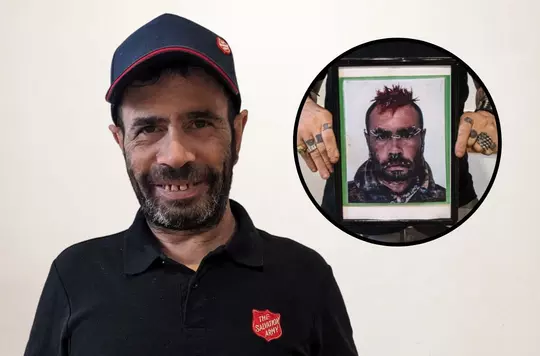14 October 2023
War Cry: ‘It’s big in prison’
George Tanton

George Tanton learns about the life-changing impact that War Cry has in prisons.
‘Some prisoners use toothpaste to stick the back page, with its inspirational biblical quote, to the wall of their cell,’ reveals War Cry Editor Major Andrew Stone. ‘It’s a door-opener to faith.’
Since its inception in December 1879, the magazine has found a faithful readership in prisons. As editor, Andrew receives up to six letters from prisoners every week as a direct result of their interaction with War Cry. Many ask about services available to them after they leave prison, or how they can get in touch with a corps. Others respond to articles they have read, or ask if they can be sent a Bible or learning materials.
‘The purpose of War Cry is to get the Christian message across in a way that is understandable to people with little or no church background,’ asserts Andrew. ‘It does this in a non-confrontational and non-judgemental way.’
The magazine can be credited for finding common ground with people of all walks of life through articles about current affairs, real-life stories, pop culture and documentaries, as well as sport.
‘All these convey real-world problems and struggles,’ explains Andrew. ‘Consequently, we can write about life’s pressures in terms that relate to a whole range of different people in different circumstances.’
Assistant Prison Ministries Officer Josefiina agrees: ‘The strength of War Cry is that it offers a conversation-starter. For people who are feeling isolated in prison, perhaps struggling with their mental health and spending a lot of time in their cell, the magazine can be a real mood-booster.’
‘War Cry is big in prison,’ says Major Alex Cadogan, a prison chaplain at HMP North Sea Camp. ‘It’s well received by a broad number of prisoners because it brings positivity, hope, fun and humour. The quizzes are very popular.’
At the height of the Covid-19 pandemic, there was a considerable increase in demand for the magazine. Today, it remains a key part of a Salvation Army prison chaplain’s toolkit.
‘It has a keen readership, even among prisoners who don’t have any faith whatsoever,’ says Alex. ‘Its accessibility comes from it not being a difficult read. There is quite a large percentage of prisoners whose levels of reading and writing are quite low or non-existent.’
‘I’m working with lots of prisoners preparing for release, some of whom have been in the system for 30 to 40 years,’ he continues. ‘Many of them will end up living alone, so they need to know how to look after themselves. I encourage them to take a look at the recipes page and create a folder of dishes they would like to make. A number of prisoners have used this resource as they would a cookbook!’
Andrew emphasises that, while there are lots of ‘light and fluffy’ articles, there are also serious discussions about the ‘deeper issues’.
‘This could be articles about debilitating medical issues or the loss of a child,’ he suggests. ‘Before they were in prison, many prisoners were just normal people in the street who had normal jobs and relationships. They may even have suffered trauma. The serious issues War Cry addresses can still resonate with someone in prison.’
Andrew highlights a letter he received recently. It referred to a review of an exhibition at the National Gallery on the subject of sin, which really impacted the reader.
‘People in prison have made bad decisions in life,’ explains Andrew. ‘Many are now looking to make amends and seek a new direction.’
Alex expresses: ‘In my prison ministry there is often discussion of a word that we seldom contemplate these days: sin. War Cry talks about right and wrong and presents it as a concept in a very reasonable way.’
‘Chaplains are not permitted to evangelise and there are very strict rules about this,’ says Josefiina. ‘However, War Cry can be implemented as a very gentle way of introducing the idea of faith, especially to a prisoner who may not have a prior understanding of or interest in Christianity.’
With this in mind, prison chaplains regularly hand out the magazine in their daily duties.
‘It adds such a personal touch when a chaplain comes to your cell and hands one out to you, while seeing how you are doing,’ Josefiina points out.
Major Paul Robinson, a chaplain at HMP Norwich, testifies to how the printed page is a powerful tool for men looking for a different way of living. After being given copies of the War Cry to distribute to people on his wing, one prisoner told him they had read each issue and decided to give their heart to the Lord.
Andrew draws hope from the positive influence of this unique ministry: ‘If, in the 20 minutes it takes someone to read an issue, it can introduce them to Jesus, then I’m happy. I want the magazine to send the message that life gets better if you follow Christ.’
Written by

George Tanton
Editorial Assistant
Discover more

Darren Wooldridge (Bognor Regis) shares how God used his time in prison for a new beginning.

Philip Halcrow interviews Jonathan Aitken and fellow ex-prisoner Edward Smyth about their spiritual survival guide 'Doing Time'.

A selection of resources including daily prayers, a video and a link to the official Prisons Week webpage
